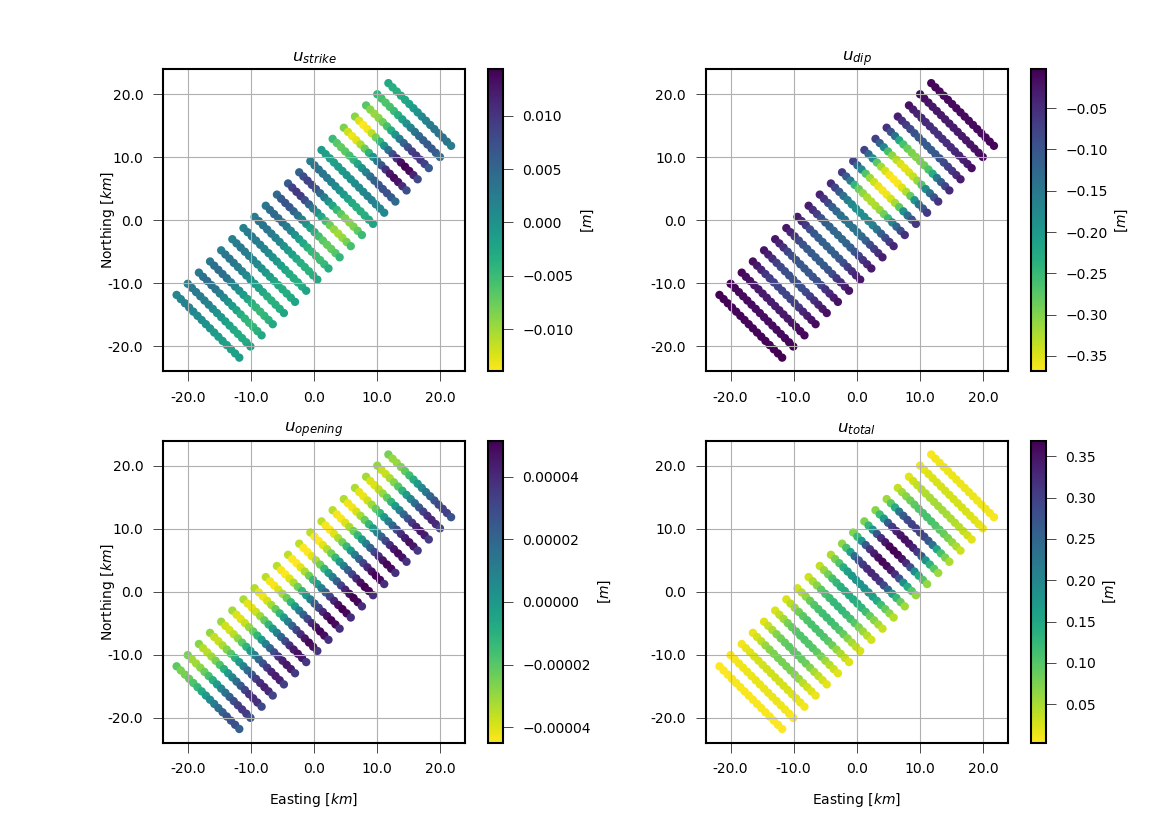Kinematic/Dynamic source parameter modeling/inversion¶
Calculate subfault dislocations from tractions with Okada half-space equation¶
In this example we create a OkadaSource and compute the spatial quasi-static dislocation field caused by a traction field. The linear relation between traction and dislocation is calculated based on Okada (1992) [1].
Download okada_inversion_example.py
import numpy as num
from matplotlib import pyplot as plt
from matplotlib.ticker import FuncFormatter
from pyrocko.modelling import OkadaSource, invert_fault_dislocations_bem
from pyrocko.plot import mpl_init, mpl_margins, mpl_papersize
km = 1e3
# Set source parameters
ref_north = 0*km
ref_east = 0*km
ref_depth = 50.*km
length_total = 50. * km
width_total = 15. * km
nlength = 20 # number of subpatches
nwidth = 16
npoints = nlength * nwidth
al1 = -length_total / 2.
al2 = length_total / 2.
aw1 = -width_total / 2.
aw2 = width_total / 2.
source = OkadaSource(
lat=0., lon=0., north_shift=ref_north, east_shift=ref_east,
depth=ref_depth,
al1=al1, al2=al2, aw1=aw1, aw2=aw2, strike=45., dip=0.,
slip=1., opening=0., poisson=0.25, shearmod=32.0e9)
# Discretize source and set receiver locations on source plane center points
source_discretized, _ = source.discretize(nlength, nwidth)
receiver_coords = num.array([
src.source_patch()[:3] for src in source_discretized])
# Create stress drop (traction) array with spatial varying traction vectors
dstress = -1.5e6
stress_comp = 1
stress_field = num.zeros((npoints * 3, 1))
for il in range(nlength):
for iw in range(nwidth):
idx = (il * nwidth + iw) * 3
if (il > nlength / 2. and il < nlength - 4) and \
(iw > 2 and iw < nwidth - 4):
stress_field[idx + stress_comp] = dstress
elif (il > 2 and il <= nlength / 2.) and \
(iw > 2 and iw < nwidth - 4):
stress_field[idx + stress_comp] = dstress / 4.
# Invert for dislocation on source plane based on given stress field
disloc_est = invert_fault_dislocations_bem(
stress_field, source_list=source_discretized, nthreads=0)
def draw(
axes,
dislocation,
coordinates,
xlims=[],
ylims=[],
zero_center=False,
*args,
**kwargs):
'''
Do scatterplot of dislocation array
:param axes: container for figure elements, as plot, coordinate system etc.
:type axes: :py:class:`matplotlib.axes`
:param dislocation: Dislocation array [m]
:type dislocation: :py:class:`numpy.ndarray`, ``(N,)``
:param xlims: x limits of the plot [m]
:type xlims: optional, :py:class:`numpy.ndarray`, ``(2,)`` or list
:param ylims: y limits of the plot [m]
:type ylims: optional, :py:class:`numpy.ndarray`, ``(2,)`` or list
:param zero_center: optional, bool
:type zero_center: True, if colorscale for dislocations shall extend from
-Max(Abs(dislocations)) to Max(Abs(dislocations))
:return: Scatter plot path collection
:rtype: :py:class:`matplotlib.collections.PathCollection`
'''
if zero_center:
vmax = num.max(num.abs([
num.min(dislocation), num.max(dislocation)]))
vmin = -vmax
else:
vmin = num.min(dislocation)
vmax = num.max(dislocation)
scat = axes.scatter(
coordinates[:, 1],
coordinates[:, 0],
*args,
c=dislocation,
edgecolor='None',
vmin=vmin, vmax=vmax,
**kwargs)
if xlims and ylims:
axes.set_xlim(xlims)
axes.set_ylim(ylims)
return scat
def setup_axes(axes, title='', xlabeling=False, ylabeling=False):
'''
Create standard title, gridding and axis labels
:param axes: container for figure elements, as plot, coordinate system etc.
:type axes: :py:class:`matplotlib.axes`
:param title: optional, str
:type title: Title of the subplot
:param xlabeling: optional, bool
:type xlabeling: True, if x-label shall be printed
:param ylabeling: optional, bool
:type ylabeling: True, if y-label shall be printed
'''
axes.set_title(title)
axes.grid(True)
km_formatter = FuncFormatter(lambda x, v: x / km)
axes.xaxis.set_major_formatter(km_formatter)
axes.yaxis.set_major_formatter(km_formatter)
if xlabeling:
axes.set_xlabel('Easting [$km$]')
if ylabeling:
axes.set_ylabel('Northing [$km$]')
axes.set_aspect(1.0)
def plot(
dislocations,
coordinates,
filename='',
dpi=100,
fontsize=10.,
figsize=None,
titles=None,
*args,
**kwargs):
'''
Create and displays/stores a scatter dislocation plot
:param dislocations: Array containing dislocation in north, east and down
direction and optionally also the dislocation vector length
:type dislocations: :py:class:`numpy.ndarray`, ``(N, 3/4)``
:param coordinates: Coordinates [km] of observation points
(northing, easting)
:type coordinates: :py:class:`numpy.ndarray`, ``(N, 2)``
:param filename: If given, plot is stored at filename, else plot is
displayed
:type filename: optional, str
:param dpi: Resolution of the plot [dpi]
:type dpi: optional, int
:param fontsize: Fontsize of the plot labels and titles [pt]
:type fontsize: optional, int
:param figsize: Tuple of the figure size [cm]
:type figsize: optional, tuple
:param titles: If new subplot titles are whished, give them here (needs to
four titles!)
:type titles: optional, list of str
'''
assert dislocations.shape[1] >= 3
assert coordinates.shape[0] == dislocations.shape[0]
mpl_init(fontsize=fontsize)
if figsize is None:
figsize = mpl_papersize('a4', 'landscape')
fig = plt.figure(figsize=figsize)
labelpos = mpl_margins(
fig,
left=7., right=5., top=5., bottom=6., nw=2, nh=2,
wspace=6., hspace=5., units=fontsize)
if not titles:
titles = [
'Displacement North',
'Displacement East',
'Displacement Down',
'||Displacement||']
assert len(titles) == 4
data = dislocations[:, :3]
data = num.hstack((data, num.linalg.norm(data, axis=1)[:, num.newaxis]))
for iax in range(1, 5):
axes = fig.add_subplot(2, 2, iax)
labelpos(axes, 2., 2.5)
setup_axes(
axes=axes,
title=titles[iax - 1],
xlabeling=False if iax < 3 else True,
ylabeling=False if iax in [2, 4] else True)
scat = draw(
*args,
axes=axes,
dislocation=num.squeeze(data[:, iax - 1]),
coordinates=coordinates,
**kwargs)
cbar = fig.colorbar(scat)
cbar.set_label('[$m$]')
if filename:
fig.savefig(filename, dpi=dpi)
else:
plt.show()
# Plot
plot(
disloc_est.reshape(npoints, 3),
receiver_coords,
titles=['$u_{strike}$', '$u_{dip}$', '$u_{opening}$', '$u_{total}$'],
cmap='viridis_r')

Footnotes